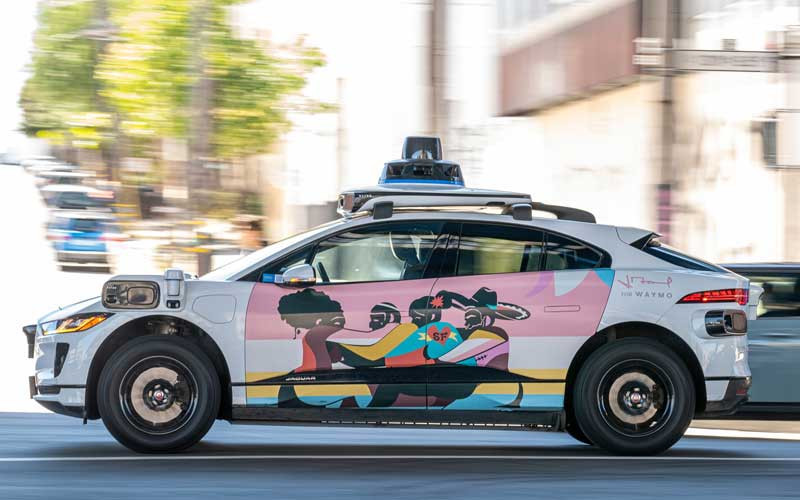
IN the science fiction movie Atlas, the main protagonist Atlas Shepherd (Jennifer Lopez) fights against an intransigent robot called Harlan (Simu Liu), who tricks his way into acquiring human intelligence and proceeds to wreak havoc, creating an army of renegade AI (artificial intelligence) bots that terrorise the world on a grand mission to destroy humanity and take over.
The world’s best AI experts are confounded and almost helpless until they call in Atlas, whose mother created Harlan. Such movies highlight bubbling and expressed fears of AI’s capacity to become more powerful and sophisticated than their human creators, to the point of having a “life” of their own.
Visiting Australian academic and AI expert Professor Geoff Webb scoffs at this and, like Atlas in the movie, says AI is “not intelligent” in the broadly defined sense of the word. (Atlas to Harlan: “You feel nothing! You’re nothing but wires and codes!”) “The thing about Artificial Intelligence,” Professor Webb says, “is that it is not intelligent.” He adds: “This is somewhat a philosophical point, given that there are many points of view about what intelligence really is. I think that computers are increasingly able to act intelligently; by that I mean they can do things that, if a person does them, we would think that, that is a smart thing to do. But they are not actually intelligent in the important sense that nothing actually means anything to them… because they don’t have feelings, they don’t have emotions, and they don’t have sensations”.
Professor Webb was in the country for a private family visit with the Hollands – the engineer Jim and his retired senator wife, Sekai, founding chair of the Zimbabwe Peace Building Initiative (ZiMPI).
Never one to pass up opportunities for interaction and network purposes as well as exploring project possibilities, Senator Holland ensured that Professor Webb’s stay in Zimbabwe - accompanied by his brother Richard - was punctuated by a rich itinerary of meetings, tours and round table discussions.
She saw his presence in the country as an opportunity for locals interested in AI to pick up ideas from a globally renowned expert on the subject.
Based at the Monash University Department of Data Science and Artificial Intelligence, Professor Webb is an eminent AI researcher who has developed many useful machine learning algorithms that are widely deployed.
A Fellow of the Institute of Electric and Electronic Engineers (IEEE), his many awards include the inaugural Eureka Prize for Excellence in Data Science (2017), the Pacific-Asia Conference on Knowledge Discovery and Data Mining Distinguished Research Contribution Award (2022) and theIEEE International Conference on Data Mining 10-year Highest Impact Award (2023).He has thrice been recognised by The Australian Research Magazine as Australia’s leading Bioinformatics and Computational Biology researcher.
- SanganaiHlanganani Expo dates set
- Govt challenges youths to participate in tourism
- Public relations :How to get ROI from expos like Sanganai/Hanganani
- HAZ annual congress to reset tourism success
Keep Reading
Opportunities
Since his arrival some two weeks ago, he has been part of a panel discussion at the Australian Embassy, toured a rural village for a meeting with a chief (Zvimba’s Chief Chirau), shared AI technology matters in an informal meeting with senior officials of the Ministry of Higher and Tertiary Education, sat down with the EU Ambassador and his team as they navigate contemporary uses of AI technology, met with the renowned architect Mick Pearce (designer of the natural temperature controlled Eastgate Shopping Mall, among other personal milestones), gave a brief lecture to the Zimbabwe Institution of Engineers (ZIE) and shared motivational nuggets to the Hollands’ youth mentees in their Boy Child Project (partnering the Girl Child Initiative).
The Webbs were also taken on a visit to Marondera for a similar youth initiative by former freedom fighter Bob Dzere, who gives young people practical lessons on exploring and exploiting natural heritage resources through an initiative he calls Nhaka Afrikan Worldview Trust (NAWT).
There, they met Spirit of Kunno Krossa founder and Dzere’s fellow war veteran Bruce Makotore and several other war veterans, as well as members of the Association of Women’s Clubs in a programme-within-a- programme to kickstart an idea for a herbarium, botanical garden and spice museum in a four-way partnership involving ZiMPI, NAWT, Spirit of Kunno Krossa and the Methodist Church in Zimbabwe’s Waddilove Institute.
His conclusion, with the disclaimer that he was not in a position to advice without full appreciation of local capabilities, was that “huge opportunities” exist for the development of technology-based solutions given the potentials of AI technologies, especially via the use of smart phones.
“One of the barriers to widespread deployment is the ability of end users to access it,” Professor Webb said in a wide-ranging interview with this writer.
“From what I can see, one way to gain widespread access to the capabilities that AI can potentially support is to propagate it through phones.
“I think any attempt to have solutions that rely on computers is not going to be feasible to get to the population, particularly the rural population at large. Phones are the device which it’s going to be very useful for people to have, for many other purposes also. We’re all using AI but it’s mosteffective when you don’t realise.”
He, however, cautioned against over reliance on AI as it had its limitations.
“It cannot create cold fusion, to name something that has not been created,” he said.
“It can’t do impossible things. AI tools have no concept of truth and falsehoods – they don’t understand anything, so don’t know what it is to be correct or incorrect; what they’re doing is they know how words go together and when you give them words (which is a prompt) they then produce the words that they think most likely follow that …and don’t know whether that likelihood leads to a truthfulness or falsehood.”
AI colonialism
The ZIE lecture was heartily received in an auditorium packed with people that included engineers, researchers, students and journalists. There was a buzz when Professor Webb cautioned his audience to watch out for what he termed “AI colonialism” due to leading AI systems being owned and or controlled by big technology companies and used to advance corporate interests.
In the subsequent interview, he elaborated further when asked and said the origins of technology systems put global consumers at the mercy of those that hosted them.
“Our systems are trained on US text and to a lesser extent European text and what they understand is how words go together in US culture and with US values.
These systems are insanely expensive to put together, in terms of not just dollars but teams of really smart people who have been highly trained but also expensive in terms of power; the biggest challenge would be in collating the corpus of data because we don’t spew out lots and lots of text.”
He said the concern was not so much in the language bits (“because the big tech companies are developing these to make money out of them”), but in countries accepting the value of the tools then developing alternative means of preserving their own cultures and values.
“For people who (for instance) only speak Shona and can’t speak English, they may not have access to the AI tools and so big tech companies can’t make money out of them; so, they’re going to add all these languages and will go through languages in order for them to gain access to the economic value of the populations that speak those languages; it doesn’t solve the cultural colonialism thing because that Shona is just fed into those models which are US-based…it’s not the fundamental problem.”
He advocated for nations to use AI, not as the primary way in which to interact with people, but in the background and promote culture and values through other means – perhaps online – as well as solutions “to use these wretched things less and spend less time on them”.
He said, “I think the real solution is to make face-to-face activities that embed culture and values so attractive and compelling to people that they want to put down their phones! If we don’t, we’re lost; our lives are going to be controlled by big tech.”
Professor Webb said any activity on any major platform on one of the digital technology tools, meant taking part in “sometimes hundreds of scientifically controlled experiments”.
Some experiments concluded that the “big tech” companies could actually manipulate people’s emotions by collecting information that could help those companies to make money.
He said it was important to be aware of AI’s advantages and disadvantages and that it was not all doom and gloom as AI tools have already been proven to be game changers that have improved the world of work. Opportunities existed, he said, when the right information was given to the right people at the right time.
“Zimbabwe is starting from such a low base and it’s in some ways handicapped because you have so little relevant resources to bring them to bear but also in some ways it’s a huge advantage because you can make massive material differences that can alter people’s way of life.
“I would urge people not to focus on AI as the secret to that; (instead) I would urge people focus on technology of which AI is a part, a tech solution to a problem for which there is an AI component to it and I’m sure there are many systems for which you don’t need the AI component.
“One of the problems is that people get so excited with AI (that they) try to solve everything with AI where there may be a better solution which requires less. It’s important for AI to be part of your armory because it’s a very powerful tool but it shouldn’t be the entirety of your armory.”
Job losses
He said even where there were fears of job losses with tech taking over “everything”, previous industrial and technological revolutions proved that new jobs could be created at the same time.
“AI is (definitely) going to change jobs,” he said, “but it can’t do the most important part of the job, because it doesn’t understand things! Those who use it most extensively are going to have a greater advantage. But new jobs are created as well.
“It is a continuation of the whole tech revolution. Big tech companies are trying to drive massive interest in it, so they’re behind the massive publicity, driving up their share values, because everybody is convinced that AI is the future.
“It furthers the digital divide – those with control become even more obscenely wealthy and those who have access to it have ever greater advantage over those who do not have access to it. Those with access and understanding have advantage over those with just access, and so it goes. After the Second World War wealth inequality increased dramatically and it’s just been getting worse and worse since; this is another tool…”
On the issue of whether AI makes people lazy, Professor Webb said, “One of the big risks is that we become lazy. I don’t think AI makes us do anything.
What AI can do is the kind of stuff that we have often valued a lot but which we should never have valued that much; for instance, it can write well, can put information together and do many of those kinds of things extremely well but it doesn’t understand what it’s doing.
“It’s like the calculator — we used to value the skill of being able to do long division and thought someone who could do that was really smart. But the ability to go through that mechanical process isn’t really the important thing. It’s the understanding of what division actually is and understanding what the results should look like and the ability to see, when you get an answer, that that’s clearly wrong, having higher level skills to understand whether this is not just a nice-looking thing but whether it’s actually the right thing: is it really making a persuasive argument for whatever point you want to make?
“At the end of the day,” he concurred, “The decision-making should remain ours but more deeply we should treat AI like an assistant — something which can do the most useful parts of a task. But the most important parts of a task, which involve decisions on trajectory, should remain ours.
“Human interaction can never be replaced. A lot of business is about forming relationships and relies on goodwill and trust. You need to be able to trust somebody.” — The Source.
Mawerera is a veteran journalist and communications expert. He is a former chairperson of the Zimbabwe Tourism Authority.










